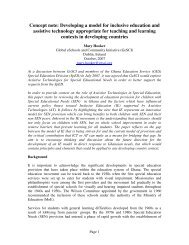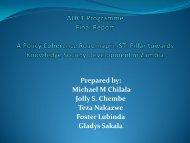African Leadership in ICT Needs Analysis South Africa - GeSCI
African Leadership in ICT Needs Analysis South Africa - GeSCI
African Leadership in ICT Needs Analysis South Africa - GeSCI
Create successful ePaper yourself
Turn your PDF publications into a flip-book with our unique Google optimized e-Paper software.
environment. There seemed not to be enabl<strong>in</strong>g structures and programmes for the<br />
implementation of the mandates (see Appendix 3).<br />
With respect to actors, it was clear from the <strong>in</strong>terviews that the key actors <strong>in</strong> def<strong>in</strong><strong>in</strong>g and<br />
implement<strong>in</strong>g the different m<strong>in</strong>isterial or departmental or organisational mandates were<br />
government departments (national, prov<strong>in</strong>cial and municipal), educational <strong>in</strong>stitutions, research<br />
councils, private sector and non‐governmental organisations (NGOs). Although it was affirmed<br />
by all <strong>in</strong>terviewees that organisations with proper collaboration with actors attract enough<br />
drivers for change, not all of them claimed such a position.<br />
On the issue of policy, plans and objectives, the consensus among all <strong>in</strong>terviewed was that<br />
although the government (past and present) have good policies and plans, implementation is<br />
always very poor. All the organisations had common goals of capacity build<strong>in</strong>g and expansion,<br />
human capital development and will<strong>in</strong>gness to implement policies. Their major constra<strong>in</strong>t was<br />
lack of provision of enabl<strong>in</strong>g structures for policy implementation on the part of government<br />
and m<strong>in</strong>imal funds for execution of projects and plans. Generally, it was also observed that at<br />
policy levels, the exist<strong>in</strong>g regulatory frameworks were enabl<strong>in</strong>g but there appeared to be<br />
problems at the level of adm<strong>in</strong>istration and implementation. While some of the organisations<br />
reported the existence of regulatory frameworks that limits their effectiveness, others saw such<br />
frameworks to be enabl<strong>in</strong>g, rather than limit<strong>in</strong>g.<br />
In terms of capacity build<strong>in</strong>g needs and leadership competencies, the general view was that<br />
there is a lack of skills <strong>in</strong> the country, thus lead<strong>in</strong>g to the problem of limited human resources,<br />
which is a great drawback for the proper function<strong>in</strong>g of a knowledge society. There is therefore<br />
the need for tra<strong>in</strong><strong>in</strong>g programmes that enhance technical skills of people. The type of leaders<br />
that are needed are not just leaders who specialises <strong>in</strong> draw<strong>in</strong>g up policies or import<strong>in</strong>g ideas<br />
and technologies but those that understand contexts and are able to apply imported ideas to<br />
meet national priorities. In general, there is a need for the development of leaders with vision,<br />
who understand the need of the community and are able to <strong>in</strong>tervene at the right time.<br />
Page 28 of 55<br />
<strong><strong>Africa</strong>n</strong> <strong>Leadership</strong> <strong>in</strong> <strong>ICT</strong>, AL<strong>ICT</strong> - http://www.gesci.org/african-leadership-<strong>in</strong>-ict-alict.html





